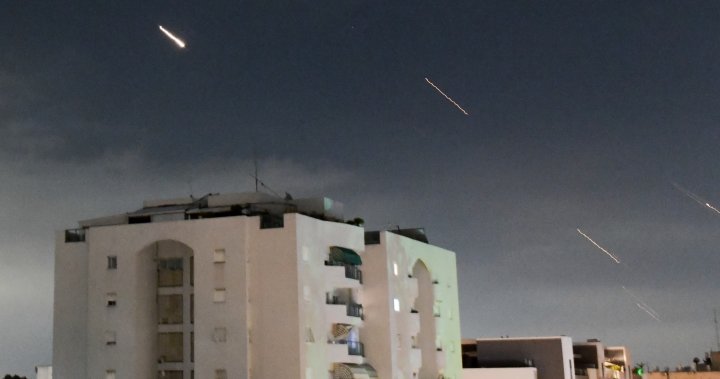Israel praised the success of its defenses in the face of an unprecedented attack by Iran involving hundreds of drones, ballistic missiles and cruise missiles while tensions ran high over a possible Israeli counter-strike.
An Israeli military spokesman said Sunday the launches numbered more than 300, but 99 per cent of them were intercepted. Rear Adm. Daniel Hagari said Iran fired 170 drones, more than 30 cruise missiles and more than 120 ballistic missiles. Several ballistic missiles reached Israeli territory, causing minor damage to an air base.
Israeli Prime Minister Benjamin Netanyahu posted on social platform X: “We intercepted. We blocked. Together, we will win.”
Defense Minister Yoav Gallant added that “the Iranian attack was blocked in the most impressive way, together with our partners, the Americans and others.”
The Iranian attack on Saturday, less than two weeks after a suspected Israeli strike in Syria that killed two Iranian generals in an Iranian consular building, marked the first time Iran has launched a direct military assault on Israel, despite decades of enmity dating back to the country’s 1979 Islamic Revolution.
Israel and Iran have been on a collision course throughout Israel’s six-month war against Hamas militants in the Gaza Strip. The war erupted after Hamas and Islamic Jihad, two militant groups backed by Iran, carried out a devastating cross-border attack on Oct. 7 that killed 1,200 people in Israel and kidnapped 250 others.

An Israeli offensive in Gaza has caused widespread devastation and killed over 33,000 people, according to local health officials.
Iran’s Foreign Minister Hossein Amirabdollahian said his country has no intention of continuing the military operation against Israel.
“At this juncture, the Islamic Republic of Iran has no intention of continuing defensive operations,” he posted on X on Sunday, and added: “But if necessary, it will not hesitate to protect its legitimate interests against any new aggression.”
Breaking news from Canada and around the world
sent to your email, as it happens.
Amirabdollahian called the attack “exercising the right of legitimate defense” and said it shows Iran’s responsible approach to “regional and international peace and security.”
The chief of Iran’s paramilitary Revolutionary Guard says the operation against Israel was more successful than expected.
Gen. Hossein Salami, in an interview with state TV, said they were still collecting information but that “the part of the hits that we have detailed and documented reports from the field show that this operation was more successful.”
He also said the Iranian forces had carried out a limited operation that matched “the evil that the Zionist enemy had done.”

Salami described the Israeli air defense system as complex, multi-layered and advanced and said passing through this system was a very difficult task.
“It means designing an operation that can pass drones, cruise missiles and ballistic missiles through this space and destroy them (targets) on the ground with extremely high accuracy,” he said.
Hamas on Sunday praised Iran’s unprecedented missile and drone attack on Israel, saying it was a “deserved response to the crime” of a strike on Iran’s consulate in Syria two weeks ago.
Prime Minister Justin Trudeau said in a statement that Canada “unequivocally condemns” Iran’s attacks on Israel.
“These attacks demonstrate yet again the Iranian regime’s disregard for peace and stability in the region. We support Israel’s right to defend itself and its people from these attacks,” he said.
Trudeau says he’s getting regular updates from the national security and intelligence advisor, the chief of the defence staff and the chief of the Privy Council.

Leaders of the Group of Seven industrialized nations will also hold a video conference Sunday to discuss the unprecedented Iranian attack against Israel.
Italian Premier Giorgia Meloni, whose country holds the G7 rotating presidency, wrote on X: “We express strong concern about a further destabilization of the region and continue to work to avoid it.”
US. President Joe Biden said the meeting is “to coordinate a united diplomatic response to Iran’s brazen attack.” The language indicated that the Biden administration does not want Iran’s assault to spiral into a broader military conflict.
Biden also said U.S. forces helped Israel down “nearly all” of the drones and missiles launched by Iran and pledged to convene allies to develop a unified response.
Biden and Netanyahu spoke early Sunday, Israeli time, their governments said. Biden said in a statement that he reaffirmed “America’s ironclad commitment” to Israel’s security — a departure from his harsh criticism over Israel’s handling of the war in Gaza.
“At my direction, to support the defense of Israel, the U.S. military moved aircraft and ballistic missile defense destroyers to the region over the course of the past week,” Biden said in the statement. “Thanks to these deployments and the extraordinary skill of our servicemembers, we helped Israel take down nearly all of the incoming drones and missiles.”
British Prime Minister Rishi Sunak confirmed on Sunday that U.K. military jets shot down “a number of Iranian attack drones” during its attack on Israel.
Sunak says the Royal Air Force sent additional planes to the Middle East to help intercept airborne strikes after Tehran announced it had launched an assault on Saturday.

“It’s clear that Iran is determined to sow discontent and destabilize the region, its own backyard,” Sunak told the BBC on Sunday. “If this attack had been successful, the fallout for regional security would be hard to overstate.”
Israel has now also reopened its airspace following Iran’s attacks.
Israel’s Transportation Ministry said the country’s main international airport has resumed operations. It said domestic airports would reopen throughout the day Sunday.
The military had announced measures on Saturday in anticipation of the Iranian attack, closing its airspace, canceling school and limiting public gatherings to no more than 1,000 people.




